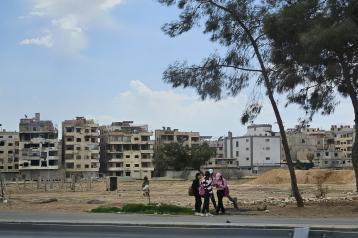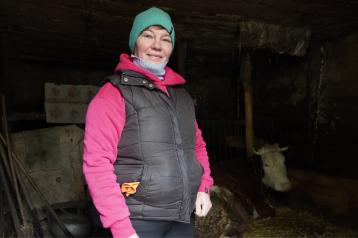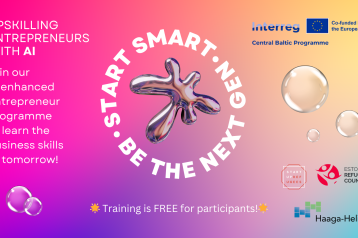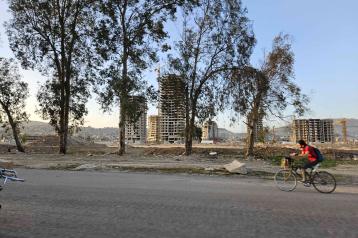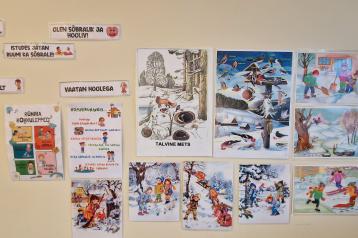The annual adaptation program #minuadapter brought together 561 people from 60
countries who, through joint actions and training, helped each other to better adapt to life
in Estonia.
For the project were produced four short videos to invite people with a migration background to participate in #minuadapter events. Music provided by Trad Attack! Watch other videos on our YouTube channel.
Moving to another country is almost always really tough. Usually while the moving, you face with new traditions, customs, different climate, and small or no support network. Jumping head first into unknown waters is scary and requires overcoming both mental and physical obstacles. It is especially difficult for people in forced situations who, in order to protect themselves and their families, have to leave their homes and travel to a new country to settle there for a shorter or longer period of time.
To make the adaptation of foreigners living here easier, we came up with the project #minuadapter in 2022. During the year, we organized various joint events for families, women and men all over Estonia, conducted work and parenting skills trainings, and invited people to workshops to give them the opportunity to practice the Estonian language in addition to hand-craft activities. We also brought together people who want to learn Estonian or people who are still adapting here and volunteers who offered personal support and the opportunity to practice Estonian.
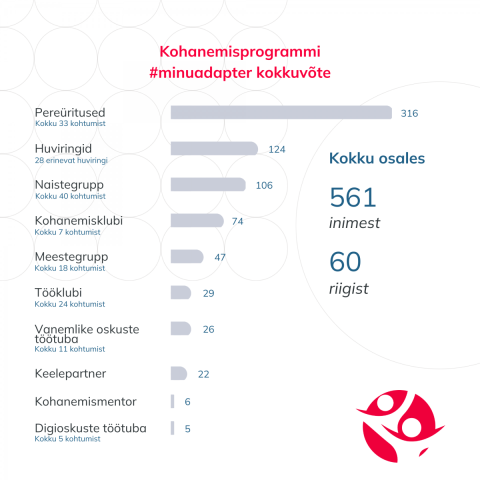
#minuadapter project is for fast and safe adaptation.
Family events
The largest number of participants was at family events, the purpose of which was to bring together people with different migration backgrounds, as well as to offer them the opportunity to get to know each other, communicate and exchange experiences in a free environment. The events worked as well as icebreaker, as soon as the participants got aware of the opportunities, which helped them to adapt. A lot of them decided to take part in them. During family events, for example, picnics were held both in the Botanical Gardens of Tallinn and Tartu, in the parks of Rakvere, as well as the opportunity to visit museums and accommodation centers throughout Estonia. A total of 33 family events were held, in which 316 people from 36 countries took part.
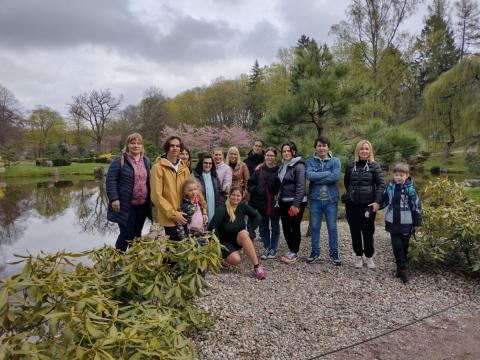
Despite unstable weather conditions, a family picnic was also held in Kadriorg Park. Good company, laugh of the kids and games with the squirrels after midday.
Adaptation clubs
The adaptation club was visited by people with different past and background. There was experience sharing on the different topics, for example, cultural shock, climate and the food culture. In addition to other Estonian entertainments, we were introduced to the sauna culture and went to enjoy the local winter activities. Team sledding, quite common for the northern people, brought a lot of joy to the participants of the adaptation club, because there were participants who raced down the mountain in this way for the first time. A total of 7 adaptation clubs took place, in which 74 people from 27 countries took part. Most of the participants were from India, Turkey and Ukraine.
Adaptation clubs have a fun and comfortable atmosphere to get to know Estonia from a completely different angle.
Women's and men's groups
Separated women and men meetings were held to support welfare and self-expression skills.Through a special method of teaching, the participants developed self-awareness and reflective skills to gain more self-confidence to participate in social activities. Also, women groups were making, for example, natural cosmetics and jeweleries, visited the island of Aegna and the center of Arvo Pärt. Men were busy with, for example, visiting the science center AHHA, island of Naissaar and were canyoning.
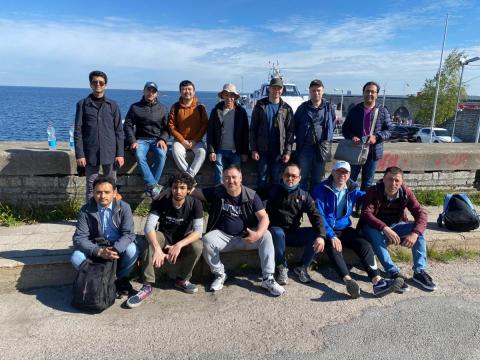
“The men's club, which consisted of Afghans, Kazakhs, Arabs, Iranians, Tajiks and other nationalities, went on a hike on Aegna. We visited beautiful places in the north and south of the island and had a picnic on a beautiful beach with food prepared by our Tajik friend,” Allen, volunteer leader of #minuadapter Tallinn male group.
A total of 40 women's group meetings were held, attended by 106 women from 33 countries. Most of the participants were from Ukraine and Syria. The number of meetings of the men's group, as well as the participants, was significantly less, however, among them there were 18 meetings, with 47 men from 18 countries. Most of the participants were from Kazakhstan (10 men). There were also participants from Turkey (6 men), Ukraine (5 men), India (3 men) and Iran (3 men).Kokku toimus 40 naistegrupi kohtumist, kus osales 106 naist 33 riigist, neist kõige rohkem olid pärit Ukrainast ja Süüriast. Meestegruppide kokkusaamiste ja osalejate arvud on küll veidi tagasihoidlikumad, kui sellegipoolest tublid 18 kohtumist, millel osalesid 47 meest 18 riigist. Kõige rohkem osalejaid oli Kasahstanist (10 meest). Järgnesid Türgi (6 meest), Ukraina (5 meest), India (3 meest) ja Iraan (3 meest).
Language learning supportive courses by interest
In the collaboration with good partners, different courses were organized that helped participants to learn language. With the help of interesting activities and fun and unforgettable experiences, the participants were more motivated to practice the Estonian language. A short list of courses offered by interest: guitar lessons, woodwork, flower arranging, ceramics, the last three of which were also the most popular among the participants.
Job, digital technology and parenting skills workshops
The workshops brought together experts in their field and participants interested in the topics. During the workshops, the experts introduced Estonian legislation, work culture, the functioning of the education system and kindergartens, as well as digital solutions such as digital signatures, e-banking, etc. For example, the participants gained practical knowledge and skills on how to find and search for work in Estonia, and together they prepared a CV and motivation letter that met the requirements. In total, 29 people from 19 countries participated in 24 work club meetings, 26 people from 14 countries participated in 11 parenting skills workshops, and 6 people participated in five digital skills workshops, five of whom came from Afghanistan and one from Turkey.
There are many different events and meetings, where you can ask everything boldly and openly and share, learn and share experiences in order to adapt to Estonia faster.
The project "#minuadapter: adaptation activities for citizens of third countries" was financed by the European Union through the Asylum, Migration and Integration Fund as well as from the funds of the internal Ministry of Affairs. International House of Pärnu, Tartu Folk High School and Tallinn Folk High School were involved as partners.
What is next?
Although the #minuadapter project has ended, we will continue similar activities this year. In cooperation with local governments, communities and active people, we try to offer various target groups activities that meet their wishes, which support the adaptation of all people with a migration background in Estonia. The activities are funded by the United Nations Refugee Agency.


